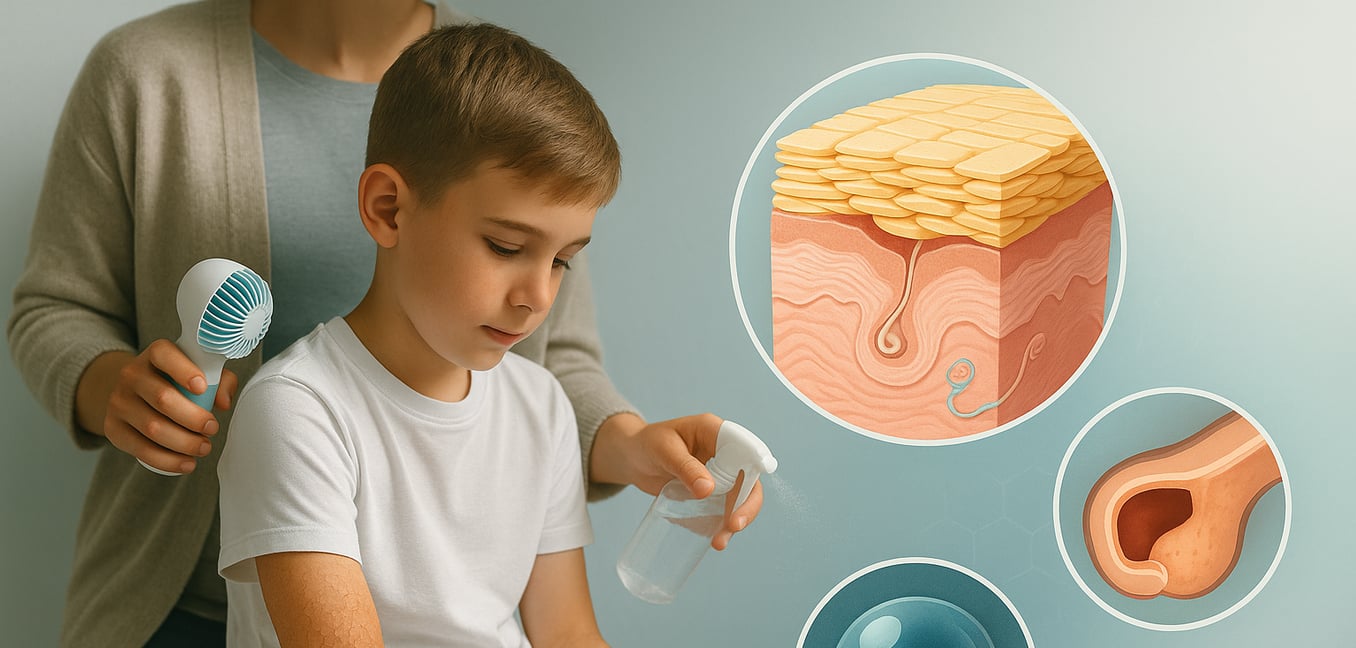What is Recessive X-Linked Ichthyosis?
Recessive X-linked ichthyosis (RXLI) is a genetic skin disorder that almost exclusively affects males. It is a "retention ichthyosis," meaning the core problem is the skin's inability to shed old, dead cells properly. This leads to a build-up of large, dark, and adherent scales, which typically appear within the first year of life.
The cause is a mutation in the steroid sulfatase (STS) gene on the X chromosome. This gene is responsible for breaking down cholesterol sulfate, a substance that acts like glue holding skin cells together. When the enzyme is missing, this "glue" accumulates, preventing the natural shedding process. While the primary symptom is scaling skin, the effects of this genetic issue can lead to several significant health complications if left unmanaged.
Major Complications of Untreated RXLI
The constant accumulation of skin cells in RXLI is more than a cosmetic issue; it fundamentally disrupts the skin's ability to function as a protective barrier. This can lead to a cascade of problems that affect not only the skin but also body temperature, sensory organs, and even systemic health. Understanding these potential complications is key to managing the condition effectively.
Severe Skin Impairment
Although the skin is physically thicker in RXLI, its protective barrier is paradoxically weaker. The retained scales create a structurally unsound outer layer, leading to several painful and persistent issues.
- Compromised Barrier: The disorganized layers of skin allow for significant moisture loss. This chronic dehydration results in extreme dryness and makes the skin highly vulnerable to irritants, allergens, and pathogens.
- Painful Cracks and Fissures: The dry, inflexible skin often cracks, especially over joints or in areas that stretch. These deep fissures are a source of constant pain and create open wounds that increase the risk of secondary bacterial infections.
- Chronic Itching: Persistent itching (pruritus) is a common and distressing symptom. This can lead to a damaging itch-scratch cycle that further breaks down the skin's already fragile barrier and worsens the condition.
Dangerous Overheating and Temperature Regulation
One of the most serious complications of RXLI is an impaired ability to sweat, known as hypohidrosis. This turns the body's primary cooling system off, creating a constant and dangerous risk of overheating.
- Blocked Sweat Ducts: The thick, tight scales physically plug sweat ducts, trapping sweat beneath the skin. This prevents the evaporation needed to cool the body, even when a person feels extremely hot.
- High Risk of Heat-Related Illness: Without a functional sweating mechanism, individuals are at a high risk for heat exhaustion and life-threatening heat stroke. This danger is most acute in warm weather, during physical activity, or when fighting a fever.
- Major Lifestyle Impact: The threat of overheating forces significant lifestyle changes. This often means avoiding sports, outdoor play, and crowded rooms, and instead relying on air conditioning or cooling vests, which can impact social, educational, and professional opportunities.
Sensory and Systemic Complications
While the skin is the primary site of concern, the effects of the underlying enzyme deficiency can extend beyond it. These complications affect the eyes, ears, and in some cases, are linked to broader systemic health risks.
Ocular and Auditory Issues
The same cell retention that causes scaling on the body can also lead to problems in the eyes and ears. These are important diagnostic clues and can cause significant functional challenges if not addressed.
In about half of adult males with RXLI, an eye exam will reveal tiny, harmless opacities deep within the cornea. These specks cause no pain or vision loss but are a unique and reliable marker for the condition. More significantly, the buildup of skin and wax in the ear canals can form a hard plug. This blockage can cause conductive hearing loss by preventing sound from reaching the eardrum and may interfere with speech development in children. It also increases the risk of painful outer ear infections.
Rare Systemic and Reproductive Risks
In a small number of cases, the genetic cause of RXLI involves the deletion of a larger block of genes, not just the STS gene. This can lead to more complex syndromes that combine ichthyosis with other conditions, such as a lost sense of smell and delayed puberty (Kallmann syndrome).
Even without a larger gene deletion, males with RXLI have a higher risk for certain reproductive health issues, including undescended testicles (cryptorchidism). An association with an increased risk for testicular cancer has also been reported, making regular health monitoring into adulthood essential. The enzyme deficiency also affects pregnancy for mothers carrying an affected son. The lack of the STS enzyme in the placenta can lead to low maternal estrogen levels, often causing a difficult or prolonged labor, which may be the first sign that a newborn has RXLI.










